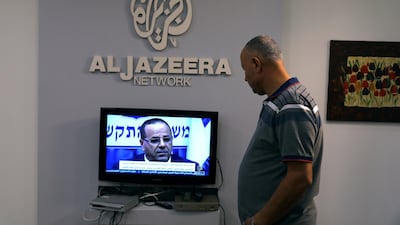Al Jazeera has again come under fire as a mouthpiece for extremist views after publishing a call for attacks on Saudi Arabia, attributed to the leader of Yemen's Iran-backed Houthi rebels.
The comment, purportedly by Houthi leader Abdulmalik Al Houthi, was tweeted on Saturday and justified such attacks as a retaliation for the US-led airstrikes on Syria's chemical weapons facilities.
“Houthi Leader: the best way to respond on the tripartite aggression is by striking Saudi Arabia and Israel,” Al Jazeera tweeted on its @ajabreaking handle.
The original tweet was deleted within an hour of being posted and replaced with an amended version describing Saudi Arabia as "financier" and Israel as "propagator".
The tweet drew critical responses from several academics and political analysts, including references to Al Jazeera's history of airing of extremist and inflammatory views.
“The war against extremism and terrorism is our battle to create a world of peace and stability. The war is on many fronts –economic, political, security, education, religion – but the most important is media,” said Dr Ali Al Nuaimi, chairman of the Hedayah centre, a non-profit counter-terrorism organisation based in Abu Dhabi.
"The Qatari regime has invested billions from the funds of the brotherly Qatari people to create media platforms with an audience of terrorist groups, such as Al Jazeera," said Dr Al Nuaimi.
_______________
Read more: Quartet says Qatar must meet demands to end boycott
_______________
Al Jazeera was also criticised for publishing a video on Sunday of Syria’s president, Bashar Al Assad, walking into his office after the airstrikes.
“Al Jazeera presents at face value Syrian propaganda showing a briefcase-wielding Assad walking to his office after this morning’s attack on his chemical weapons facilities. Few media outlets that aren’t sponsored by Assad & his allies republish such propaganda without scrutiny,” said Mohammed Al Yahya, non-resident fellow at the Atlantic Council.
Dr Anwar Gargash, Minister of State for Foreign Affairs, last year sent a letter to the UN High Commissioner for Human Rights, Zeid Ra’ad Al Hussein, detailing the UAE’s concerns that the Doha-based network promotes extremist ideologies.
The UAE, Saudi Arabia, Bahrain and Egypt have cut ties with Qatar over its support for terrorism, citing Al Jazeera’s political agenda as one the reasons for their boycott imposed last June.
The network has been criticised in the past for hosting a weekly show by Yusuf Qaradawi, an Egyptian cleric and spiritual figurehead of the Muslim Brotherhood, which has been outlawed as a terrorist group by several countries in the region.
Al Jazeera has defended its dissemination of extremist views as a policy of objective journalism. The boycotting countries say the protection of the right to freedom of expression "is not absolute".
The network's offices in more than a dozen countries have been closed at various times over objections to its content. It has been barred from operating in Saudi Arabia, the UAE, Jordan, Israel, Palestine, Bahrain and Egypt among others.
The state-owned network claims that its editorial decisions are unaffected by the Qatari government. However its outlets, while often the first to report on dissent or uprisings in the region, seldom cover happenings in Qatar.

